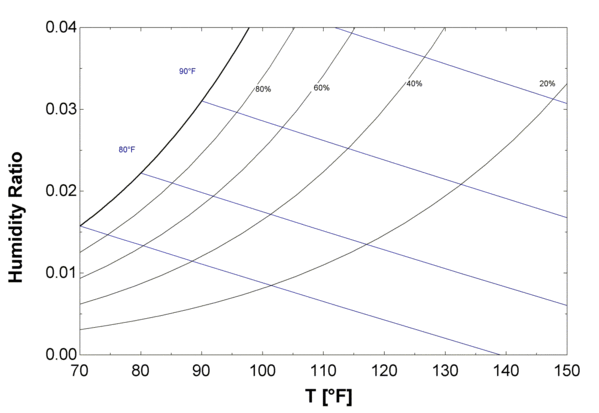No sunlight. No heat, unless absolutely needed.
OK, I'm making the assumption that you want to produce the highest quality hop possible, meaning it has higher than the standard oil content, most of its aroma's and all the alpha's it started with. This isn't always the case (e.g. hops for alpha acid extraction) but smaller growers usually want to sell to craft brewers and home brewers that are excited about hops that smell like hops instead of straw.
Heat boils off oils, it drives away aroma and it can degrade the alpha acids. Sunlight is a form of heat and it has other deteriorating effects to the cones.
Sunlight is not an option. Forget about it. If you want a solar collector to gather heat, go for it but you won't need it.
Why do I say that? You are in Colorado. You are in a desert. Look at the image I have attached:
This is a psychrometric chart. Along the bottom is air temperature along the side is absolute moisture content of the air. The lines that slant up from left to right are Relative Humidity. When you heat air up, you do not add moisture but it causes the relative humidity to decrease. For example, pick the point 80F and 40% RH, which is probably humid for you. Now heat the air up to 130F and you can see the RH has now dropped below 20%, probably below 10%.
So what? The lower the relative humidity, the more moisture the air wants to grab from the cones. So by lowering the RH, you can dry cones faster. But you are all ready in a desert, so you can't get the RH much lower...added to the fact that heat damages the wonderful flavors...and I would recommend an open system that just passes air over the cones.
If you want, feel free to e-mail me at [dan at gorstvalleyhops.com] and I can answer more of your questions. Pass it on to your neighbors as well. If they put in 10 acres, they should be harvesting now and practicing the drying process so they don't screw it up when it counts next year. I can't tell you how many people ship me samples to analyze that they think are dry but when they arrive, I open the bag and the rank smell of compost hits me and the whole package is rotten.
On the up side, rotten hops make incredible fertilizer for tomatoes. I dropped over 100 lbs on my bed last year he and this year, I'm canning a bushel or two of tomatoes every week.








![Craft A Brew - Safale BE-256 Yeast - Fermentis - Belgian Ale Dry Yeast - For Belgian & Strong Ales - Ingredients for Home Brewing - Beer Making Supplies - [3 Pack]](https://m.media-amazon.com/images/I/51bcKEwQmWL._SL500_.jpg)




















































